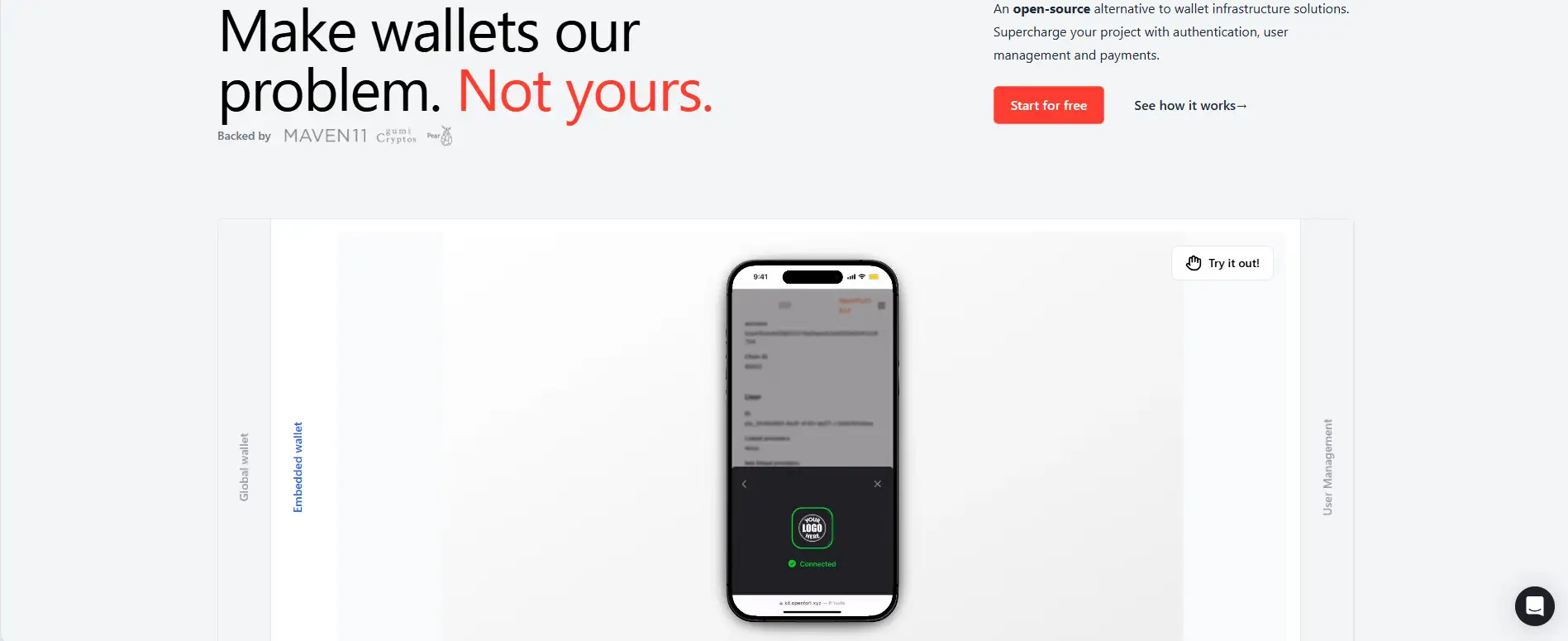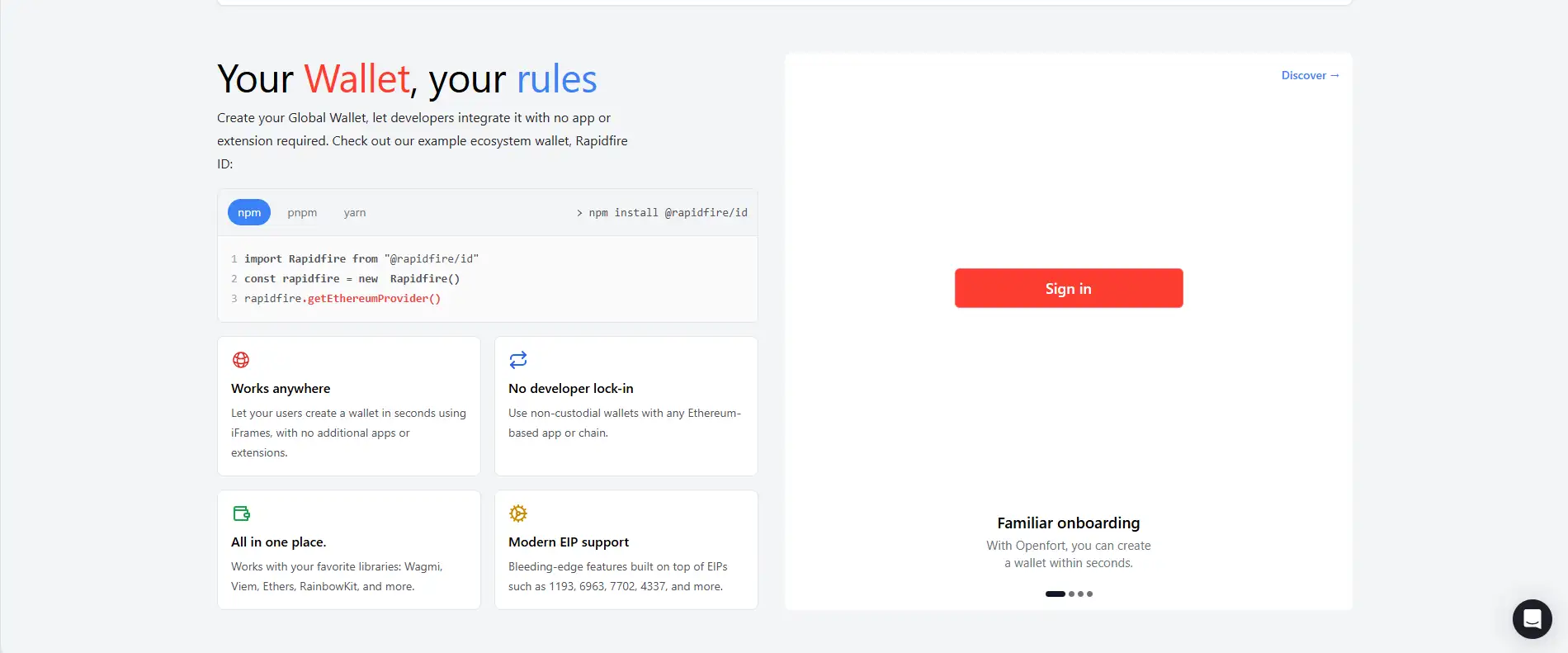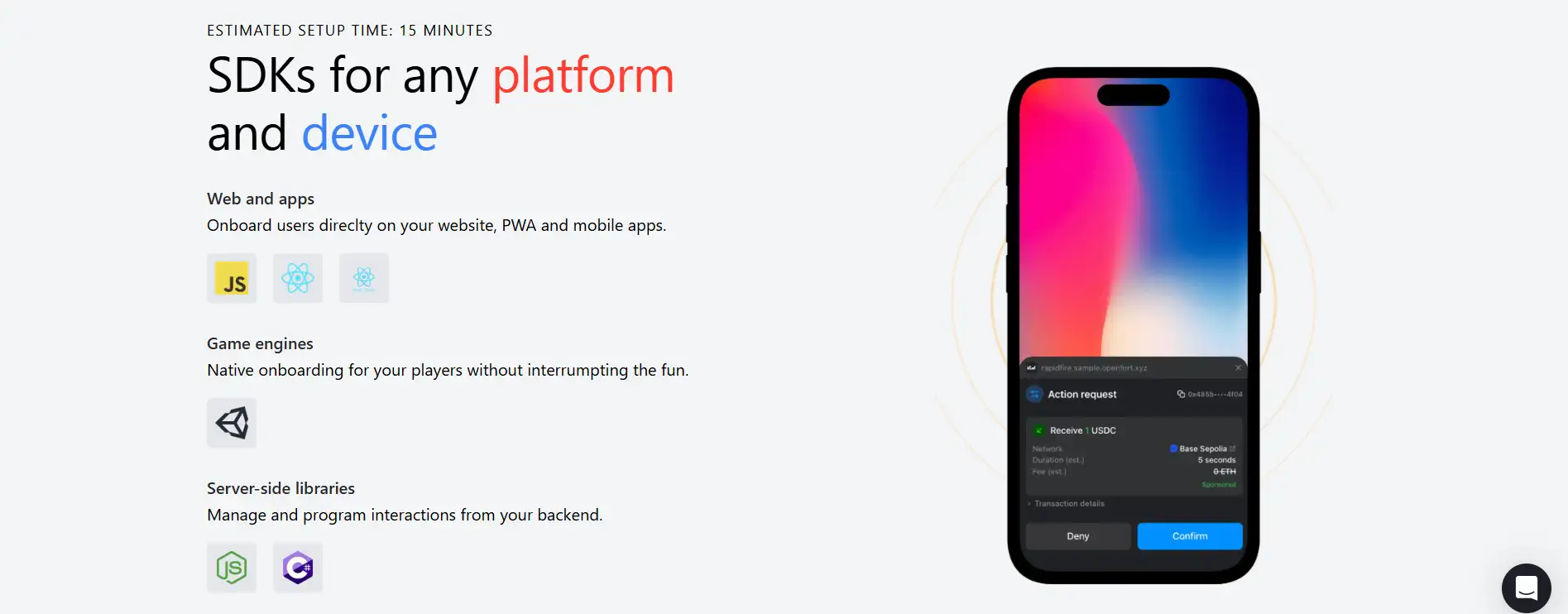About Openfort
Openfort is an open-source wallet infrastructure platform that empowers developers and businesses to integrate advanced crypto wallet functionality without sacrificing user experience or security. Designed for scalability and ease of use, Openfort supports everything from embedded wallets to backend wallet services and full-fledged global wallet frameworks—all within a modular, flexible system.
With Openfort, projects can implement non-custodial wallets, user authentication, transaction management, and smart account frameworks like ERC-4337 and EIP-7702—all without requiring users to download browser extensions or apps. Whether you're building a game, DeFi app, consumer product, or enterprise solution, Openfort delivers the infrastructure to scale blockchain functionality to millions of users securely and efficiently.
Openfort is engineered to solve one of the most pressing challenges in Web3: building seamless, secure, and scalable wallet and authentication systems. The platform provides developers with a full lifecycle wallet solution, covering everything from user onboarding to transaction signing and session key management. By abstracting away complex blockchain operations and offering a plug-and-play model, Openfort drastically reduces development time and infrastructure overhead for teams building blockchain-enabled apps.
A key strength of Openfort is its broad support for multiple chains and protocols. With native compatibility for over 25 EVM and SVM networks, developers can build chain-agnostic applications without locking into a specific provider. The platform also integrates seamlessly with key libraries such as Wagmi, Viem, RainbowKit, and ethers.js, ensuring maximum flexibility in both frontend and backend implementations.
Global Wallet is one of Openfort’s standout features—an abstract wallet framework that allows apps to launch production-ready smart wallets with built-in authentication, payments, and modular integrations. Teams can choose their preferred authentication method (Privy, Dynamic, WebAuthn) and smart account system (ERC-4337, ZeroDev, Biconomy) to build a fully branded experience. This makes Openfort a compelling option for companies looking to provide a single-wallet solution across apps, platforms, and devices.
Embedded Wallets make it possible to onboard users invisibly. Players in a game or users on a website can be issued secure, non-custodial wallets instantly, with no extensions, pop-ups, or friction. Openfort supports email, social, and passkey logins, ensuring wide accessibility while still upholding Web3 values like user ownership and key sovereignty. Developers can even pre-generate wallets linked to email addresses to enable guest mode capabilities.
Backend Wallets offer trusted, server-side signing tools for automated or internal processes like NFT minting, transaction batching, and in-game operations. Combined with transaction simulation, webhooks, and RPC optimization, Openfort guarantees both security and performance across enterprise-scale operations. From startups launching MVPs to large ecosystems onboarding millions of users, Openfort provides the technical backbone to make it possible.
Some leading competitors in the space include Privy, Thirdweb, and Dynamic. However, unlike these platforms, Openfort is fully open-source and offers more flexible infrastructure with powerful features like chain abstraction, branded wallet SDKs, and real-time RPC optimization—making it the infrastructure of choice for builders who value scalability, transparency, and speed.
Openfort provides numerous benefits and features that make it one of the most robust wallet infrastructure platforms in the Web3 space:
- Embedded Wallets: Launch invisible, non-custodial wallets that integrate directly into web or mobile apps, enabling seamless onboarding.
- Global Wallet Framework: Deploy branded smart wallets with authentication, session management, and multi-chain compatibility.
- Backend Wallet Services: Secure server-side infrastructure for signing transactions, minting assets, and executing backend operations.
- Multi-Chain & Chain Abstraction: Operate across 25+ chains using a unified interface with full support for EVM and SVM chains.
- Custom Auth Integration: Support for email, social login, passkeys, and third-party auth providers like Privy, Dynamic, and WebAuthn.
- Modern EIP Support: Built-in features for ERC-4337, EIP-7702, and future-ready specifications to ensure smooth user experiences.
- Optimized RPCs & Uptime: Built-in infrastructure monitoring ensures every request uses the fastest, most reliable RPC and bundler.
- Open Source Core: Developer-friendly platform with full access to documentation, SDKs, and GitHub examples.
Openfort offers a developer-first onboarding experience designed for speed, flexibility, and ease of use:
- Create an Account: Go to Openfort and click “Start for Free” to register your project and access the dashboard.
- Generate API Keys: Set up your first project and obtain your API credentials for testing and live environments.
- Choose Your Wallet Type: Pick between Embedded Wallet, Global Wallet, or Backend Wallet based on your use case.
- Install SDKs: Use your preferred tech stack (React, Unity, Node.js, C#, etc.) and install relevant SDKs from Openfort Docs.
- Onboard Users: Enable login via email, social accounts, or passkeys. Optionally link existing wallets using wallet connectors.
- Deploy on Testnet: Use the provided RPCs and transaction simulators to test across supported networks securely.
- Go Live: Once tested, go live by integrating Openfort into your production environment and monitor activity through webhooks and dashboard tools.
Openfort FAQ
Openfort enables the creation of non-custodial embedded wallets that users can access without needing to install extensions or apps. By integrating wallets directly into the application via iFrames and JavaScript SDKs, users can create and use wallets in seconds. The process supports email, social, and passkey login methods, providing a seamless experience that feels like Web2 while preserving Web3 ownership principles. Learn more at Openfort.
Yes, Openfort is designed to be authentication-agnostic, allowing you to plug in either custodial, non-custodial, or hybrid wallet systems based on your project’s needs. You can integrate authentication tools like Privy, Dynamic, or WebAuthn and pair them with smart wallet frameworks like ERC-4337 or EIP-7702. This makes Openfort highly adaptable across fintech, gaming, and consumer apps.
Openfort offers invisible in-app wallets and pre-generated non-custodial wallets that allow players to onboard instantly with familiar logins like email or social accounts. Game developers can use Unity SDKs and session key management to securely authorize in-game transactions without interrupting gameplay. These tools allow gaming studios to integrate blockchain features while keeping the user experience smooth and intuitive. Visit Openfort to see real examples.
Openfort offers a fully modular, open-source architecture that gives developers complete control over wallet deployment, UI customization, and authentication logic. It supports modern frameworks like React, Node.js, and Unity, and includes tools like pre-built UI components, branded SDKs, and automatic contract ABI management. The Openfort Docs and live API references further streamline development and integration workflows.
Openfort implements a high-availability system using indexed and monitored RPCs and bundlers to route every transaction through the most optimal path. Combined with transaction simulation, webhooks, and role-based access control, the platform guarantees secure execution and full transparency. User data remains protected through encrypted communication and SSS-secured non-custodial key management. Learn more on Openfort.
You Might Also Like












